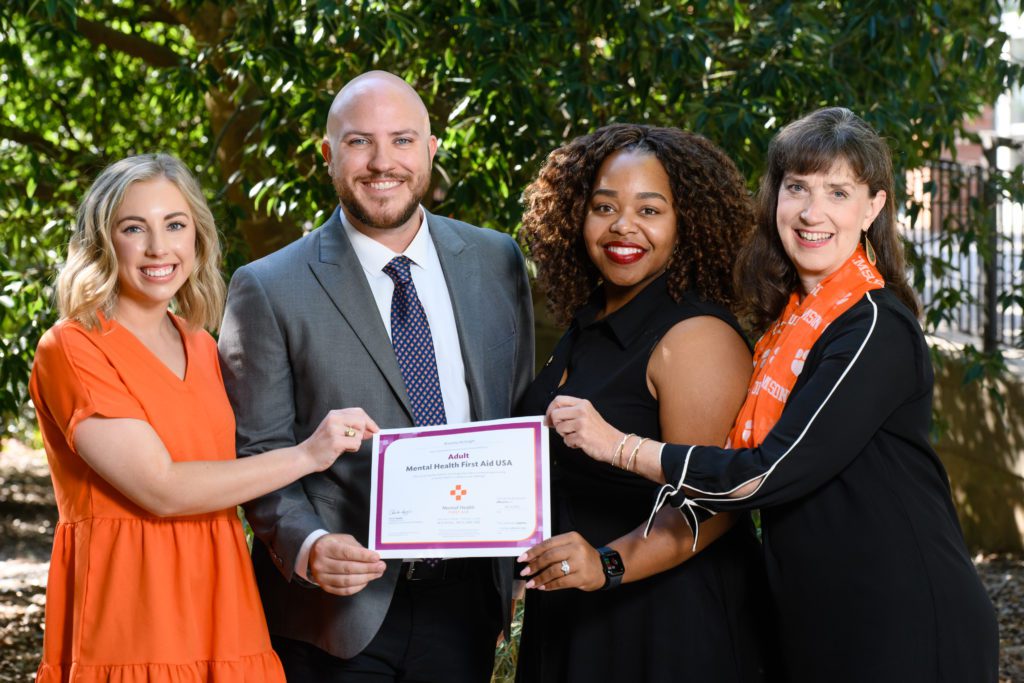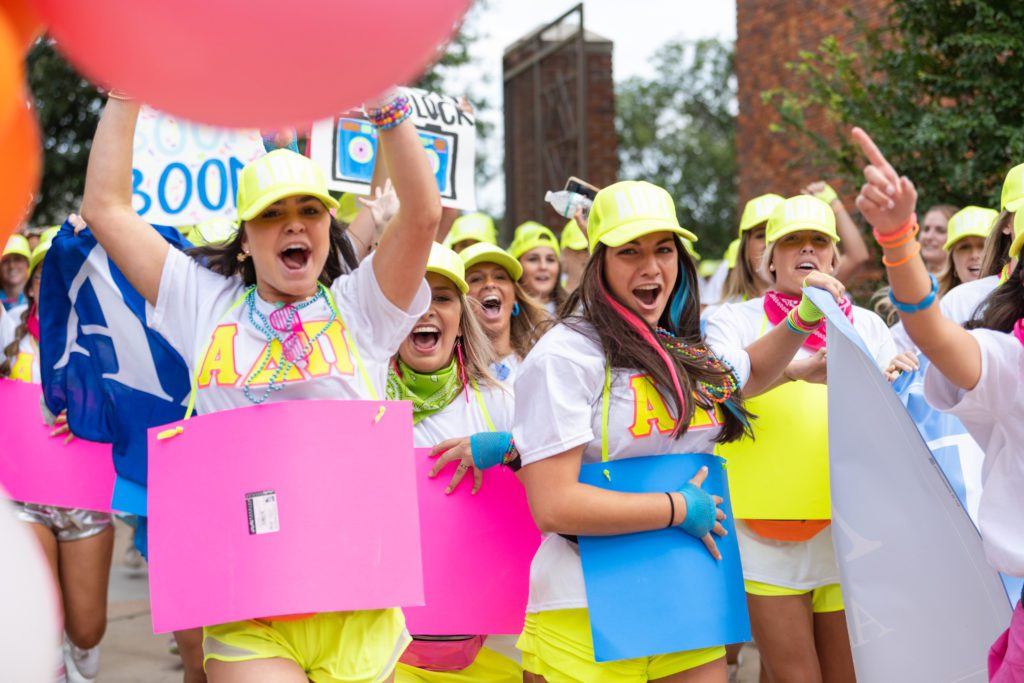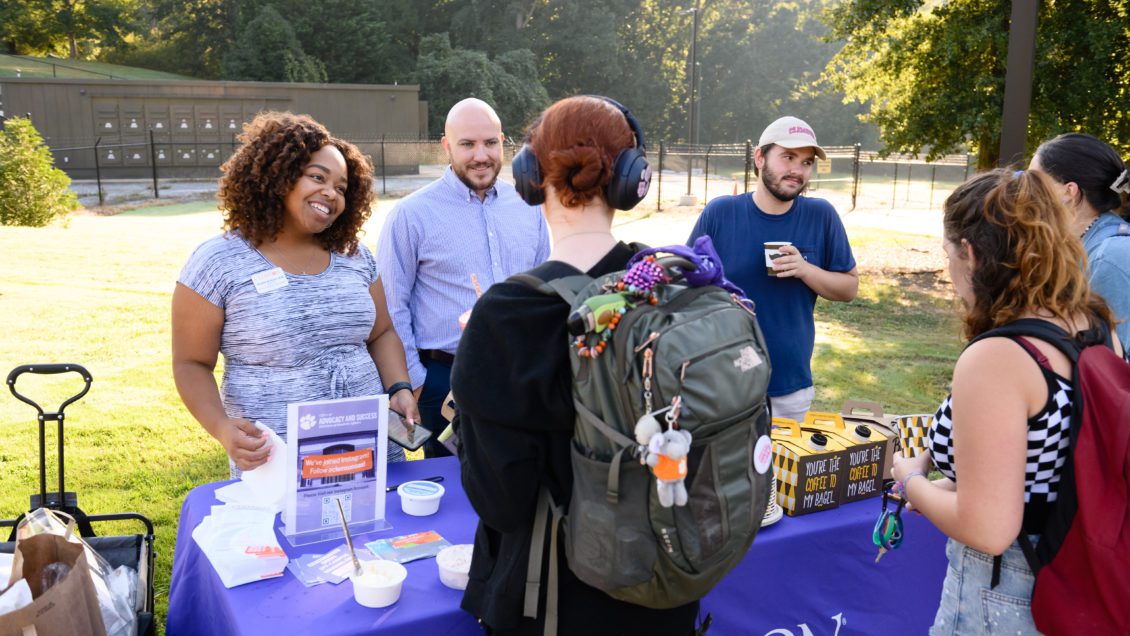Over the last couple of years, Student Affairs staff have come together in the virtual space to celebrate successful collaborations and share in the work being done across the division to support students. The four-part installment each year is known as Experience: IMPACT, and earlier this week practitioners met over Zoom to focus one of the division’s core themes — health, safety and wellness.
The meeting served as a prelude for one of Clemson’s institutional focuses that has emerged over the past year, the well-being of students and employees.
“As we move through a broader well-being initiative, we are focused on our entire campus community,” said Senior Associate Vice President for Student Affairs George Smith. “Prior to this initiative, we didn’t see a cohesive strategy and well-being wasn’t viewed holistically. Our goal is to embed well-being into the University’s operational enterprise and increase access to educational tools and resources for members of our campus community to use to invest in their well-being. We want to be a national model, because of the impact this work will have in people’s lives. We’re very happy with the work that’s been done so far.”
—
Kristin Walker-Donnelly, director of assessment in Student Affairs, expounded on Clemson’s institutional well-being initiative in the first of five short presentations.
Vice President for Student Affairs and Dean of Students Chris Miller was asked to spearhead the institutional well-being initiative in September 2021. In consultation with an outside expert, Miller and others from a number of divisions and areas across the University came together a month later in a retreat to discuss goals in relation to the initiative.
What resulted was the creation of multiple goal teams, which in turn offered several recommendations to University leadership. One goal team is currently conducting an Inventory of well-being programs and initiatives to develop an exhaustive list of what’s being done — and to identify ways to be more intentional. Another recommended Clemson hire a chief well-being officer following research that showed about 30 universities nationwide have a similar role on staff. Yet another goal team is developing training that will become part of annually required well-being modules for University employees.
While other goals exist and work continues across the board, Walker-Donnelly said the work represents a paradigm shift.
“Much like safety and security at football games completely changed from relying solely on checking bags at the gates of Memorial Stadium, CUPD and others developed a complex system to keep us safe,” she said. “To bring that analogy to well-being, we cannot rely solely on our amazing colleagues in Counseling and Psychological Services. It takes all of us to play a role. By shifting our approach, we can make an impact on student and employee well-being.”
—
Emily DaBruzzi has been director of Military & Veteran Engagement for about six months, but she has been busy during that period of time. A 10-year Navy veteran, DaBruzzi has doggedly pursued four E’s the office focuses on — engagement, enrichment, empowerment and education.
Earlier this semester, she collaborated with Skye Arthur-Banning and Margaret Domka from the Department of Parks, Recreation and Tourism Management to offer mental health first aid training. Acknowledging student veterans have additional stress and challenges from that of traditional first-term students, she wanted to take action and schedule the training as a means for better supporting veterans.

What she saw was an initial wave of interest from support staff, not necessarily student veterans. Because community partners serve Clemson’s military-connected students, she decided to capitalize on the interest and filled available seats with support staff. The course was funded by a grant from the U.S. Department of Veterans Affairs.
“We were able to fill all 30 seats,” she said. “We saw a 90-percent completion rate. The content was emotional, because we taught the course from the lens of what military families and veterans experience.”
Twenty-seven individuals earned national certification through the course, including four veterans, two military spouses and others who had a personal connection to service members. DaBruzzi hopes to expand training partnerships in future semesters to groups like Healthy Campus, Counseling and Psychological Services and Clemson University Police Department.
“We want this to be very accessible,” she said. “We’re excited by the impact of the training and how we’re able to have a small part in the well-being initiative at Clemson.”
—
The Office of Advocacy and Success is a centralized source of care for students. Staff members provide advocacy and referrals to community and campus partners through what is known as the CARE Network.
Advocacy and Success is only as effective as the partnerships it has formed. On a yearly basis, Breanna McKnight’s staff evaluates its relationships and determines strengths, weaknesses and opportunities for improvement based on those assessments.
CARE cases have risen steadily year after year, surpassing more than 2,300 reports in FY22. As part of its annual evaluation, Advocacy and Success identified an opportunity to better support residential students when it came to referring lower-level cases — such as roommate conflict or student engagement concerns.
“We assigned two graduate assistants in Residential Living to manage these cases,” McKnight said. “This has been a very effective pilot initiative and we’re excited to see where it continues to go.”
Early returns are promising. McKnight reported improved efficiency in addressing cases through the new approach. From July 1 through October 7, Advocacy and Success opened 274 cases for residential students. She said while not all of them were necessarily classified as “lower level,” it does provide a snapshot of the volume of cases handled by the graduate assistants in Residential Living.
“We’ve seen this partnership thrive in a short amount of time,” she said.
—
Wellness Advocates were first introduced within the Fraternity and Sorority Life (FSL) community in 2017 as certified peer educators. A delegated student organization, the group began modestly with seven members that first year. Its overarching purpose is to serve as the “eyes and ears” of the Greek community in relation to health and wellness needs.
“Over the past few years, we started to see drastic increases in membership, especially with our Panhellenic organizations,” said Ashley Underwood, a graduate assistant in FSL who advises the Wellness Advocates. “Although more students are involved and excited, some can feel disconnected. And as society has focused on mental health and well-being, students have started to talk about issues their chapters are experiencing more openly.”
Students involved in the organization serve a one-year term and sit on one of three committees: advocacy, education and public relations. Last year, Wellness Advocates brought in an outside speaker to talk about the dangers associated with fentanyl poisoning. Another well-attended event focused on cultural appropriation, a joint effort with FSL’s Diversity, Equity and Inclusion Ambassadors.

Underwood outlined some of the group’s next steps, most notably a bigger focus on peer facilitation when it comes to health and wellness dialogue. She also wants to see Wellness Advocates continue to foster autonomy with members and tailor more of the group’s training to observed or encountered issues.
Annie Walker is a financial management major and member of Alpha Delta Pi. She also serves as president of Wellness Advocates, which now stands strong with 21 members. One trend she’s noticed so far in Fall 2022 is much higher initiative and self-sufficiency on the part of students.
“We’ve seen much higher passion for the topic areas we work with,” she said. “Our goal is to develop an inclusive, healthy and educated FSL community. We take knowledge of trends and needs that we observe and utilize that as inspiration for the things we plan. It’s part of what has made our group so successful, because we’re catering to the exact needs of our community with empathy and understanding.”
—
One of the hidden gems on campus is Clemson’s partnership with University Physical Therapy and Sports Medicine (UPTSM). Tucked away in the upper mezzanine of Fike Recreation Center, UPTSM provides care to students, faculty and staff with orthopedic or musculoskeletal issues while also mentoring students interested in pursuing physical therapy or athletic training careers.
Dana Van Pelt arrived at Clemson six and a half years ago, and what he found was a growing interest in professional physical therapy. With the help of two associates, Van Pelt’s group acts as preceptors for two graduate assistants who provide care to ROTC and Club Sports athletes. Additionally, the office provides free consultations for individuals with aches, pains or joint mobility issues.
“We are very privileged to be part of what’s going on in Student Affairs and working alongside colleagues in Campus Recreation,” Van Pelt said. “The graduate assistants and student interns we supervise are able to cycle through clinical settings, giving them experience and exposure.”
UPTSM aims to get people moving again and keep individuals healthy. Seventy-five percent of its patients are students. In addition to Campus Rec, the office has formed campus partnerships with Redfern Health Center, Sullivan Center, the Department of Health Sciences, Clemson Athletics and Clemson University Police Department. They regularly collaborate with external partners such as AnMed Health, Bon Secours St. Francis Hospital and the Medical University of South Carolina — among many others.
Van Pelt acknowledged the importance of supporting the campus community with everyday physical therapy or athletic training needs, but he said the biggest reward is working with aspiring professionals.
“Incorporating students who are truly interested in this profession to come in and observe what we do — and helping them all along the way — is what we’re hoping to accomplish.”

